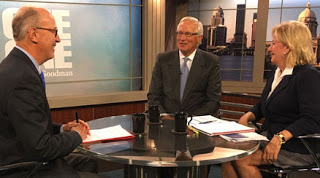Some comments on Medicaid plan will be adopted, and federal officials will approve revised plan, state officials say on KET

 |
| L-R: Host Bill Goodman, Brinkman, Glisson. (KET photo) |
By Al Cross
Kentucky Health News
Some of the comments about proposed changes in the state Medicaid program will be included in an “improved” plan to be submitted to federal officials in about two weeks, Health Secretary Vickie Yates Brown Glisson said Sunday on KET’s “One to One.”
“We got some great comments; we got some very thoughtful comments” on ways the plan can be improved, Glisson said. “We are anxious to take some of those comments and incorporate them.” She did not elaborate.
Glisson and State Cabinet Secretary Scott Brinkman also touched on what they said were some misconceptions about the plan – which Gov. Matt Bevin has proposed to reduced costs and increase involvement of Medicaid recipients who are covered by the 2014 expansion of eligibility to people with incomes up to 138 percent of the federal poverty threshold.
For example, Brinkman said the proposed removal of dental and vision services applies only to adults in the expansion population who are not medically frail. “We’re very comfortable with that decision,” he said. Such recipients could earn dental and vision care by doing such things as taking a health literacy course.
The plan also requires able-bodied adults who are not primary caregivers of a dependent to have a job, look for one, take job training or do volunteer work. “We’re talking about volunteerism,” Brinkman said. “We know that once people are engaged they tend to grow in self-esteem, self-satisfaction” and have better lifestyles.
Glisson said the rule would apply to 215,000 people, “a very small segment” of the overall Kentucky Medicaid population of 1.2 million. The expansion population is about 430,000, so the rule would apply to about half of those in the expansion.
The plan would require almost all Medicaid recipients to pay premiums of $1 to $15 a month, another feature that has brought objections from the poor and their advocates. Brinkman said $180 a year for people above the poverty line “is a pretty good deal.”
Glisson said advocacy groups “didn’t care so much for the co-pay system,” now in place for traditional and expansion Medicaid, and “liked the idea of a cost sharing being more like a premium. . . . It’s very budgetable.”
Managed-care companies that handle Medicaid have been waiving the co-payments, primarily as a way to get Medicaid recipients to choose them, but state officials have said they will stop that.
Glisson said traditional Medicaid recipients who don’t pay premiums would be required to make co-payments. Expansion recipients who failed to pay would be dropped from the system but could get back in if they paid up and took a financial- or health-literacy course.
Some critics of the plan have said it is designed to be rejected by federal officials, allowing Bevin to return to his initially stated campaign goal of abolishing the expansion. Brinkman denied that and said he was “convinced” that the Centers for Medicare and Medicaid Services will approve the revised request for a waiver of federal rules to allow the plan to proceed.
“There are some things they have not approved in the past [in other states] but they haven’t been structured like they have been” in Kentucky’s plan, Brinkman said. “At the end of the day I’m convinced CMS will see that and approve our waiver.”
The comment period on the initial plan ends at 5 p.m. ET July 22. Comments can be emailed to kyhealth@ky.gov. “Please write and give us your comments and your thoughts,” Glisson said. “We would really welcome that.”